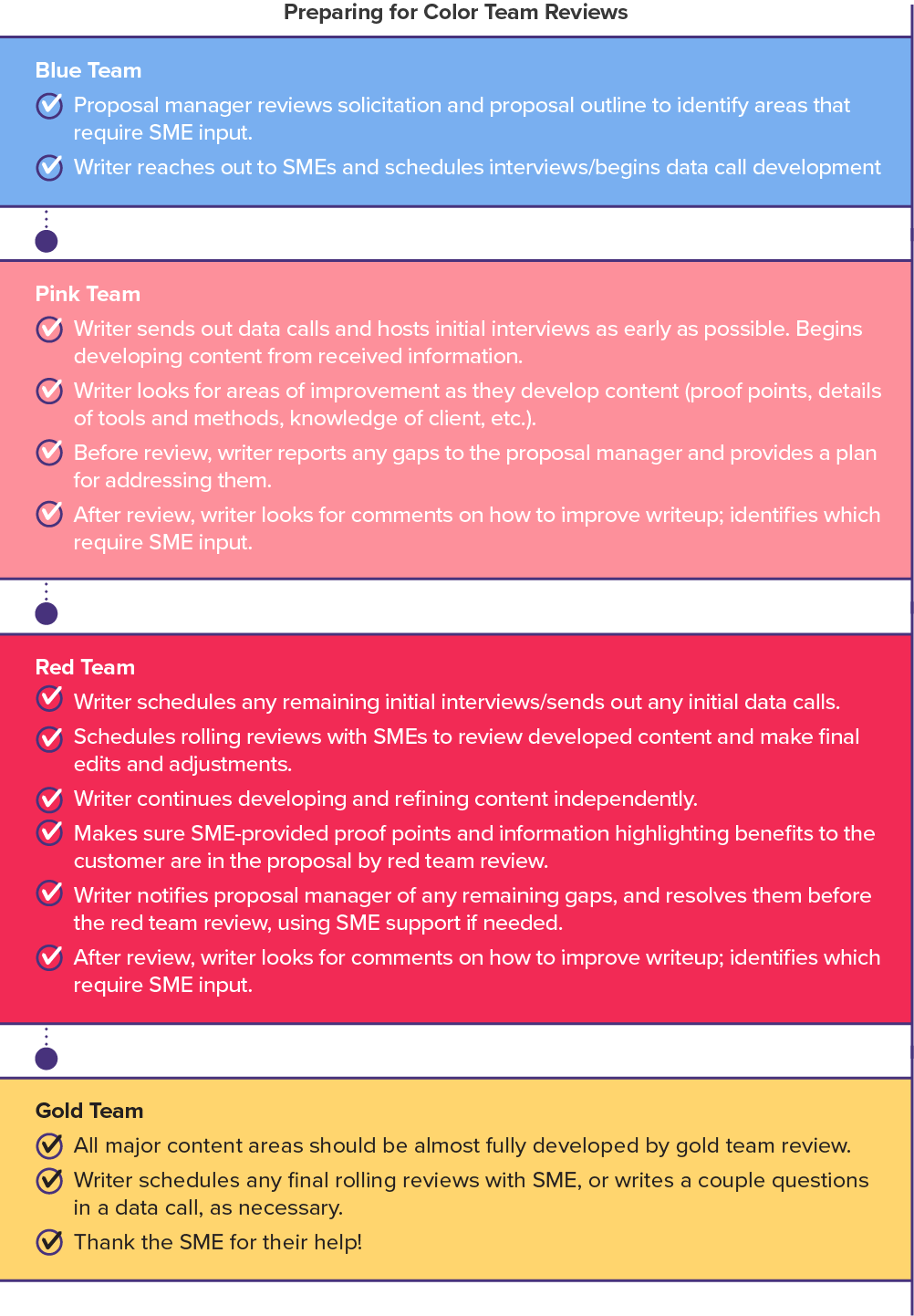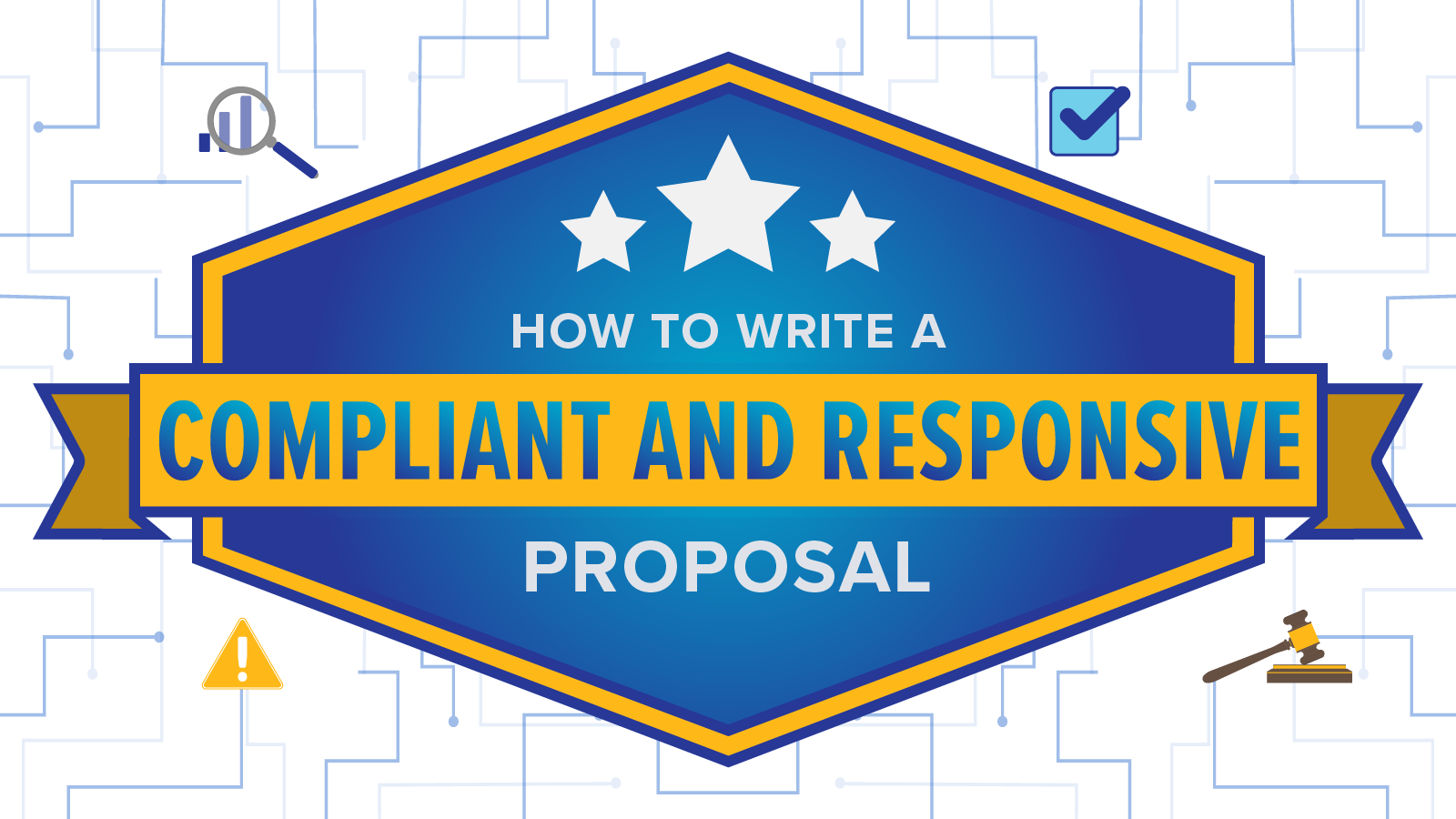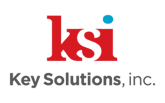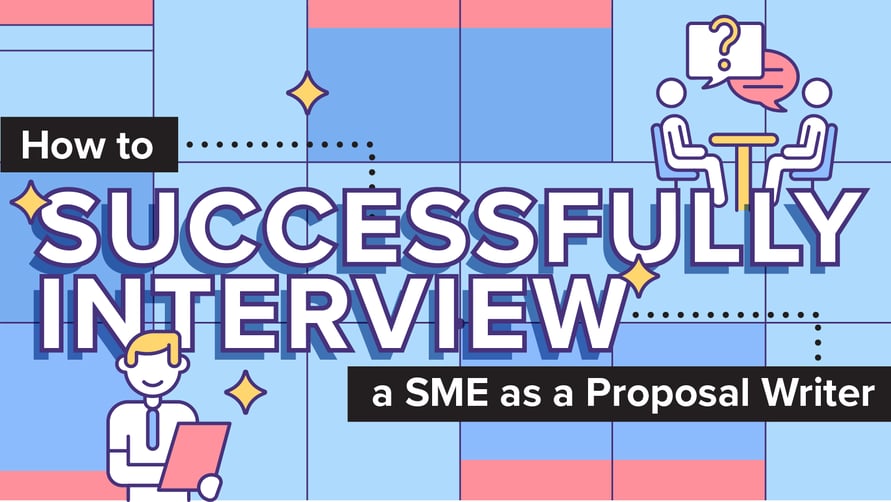
To write a winning proposal, a proposal development team must present a solution that addresses the customer’s technical needs in a compelling, easy-to-understand narrative.
While proposal writers are experts in persuasive writing, they are not typically experts on highly technical solutions. As such, writers must often interview Subject Matter Experts (SMEs), who have detailed knowledge of the proposed solution that addresses the solicitation requirements.
The SMEs you interview may be experts about the customer and their goals and expectations, the proposed technical solution and its benefits to the customer, and/or the proposing company’s unique capabilities and qualifications to accomplish the work. In this way, writers can use SME expertise to produce an informational proposal that addresses customer needs and clearly demonstrates how the proposing company’s tailored solution will benefit the customer.
This article will show how proposal writers can effectively solicit information from SMEs to develop a winning proposal, including:
- What is a SME?
- Why do proposal writers need SMEs?
- How do SMEs fit into the proposal lifecycle?
- What do proposal writers need to prepare before contacting SMEs?
- How can writers solicit information from SMEs? (i.e., data calls and SME interviews)
- How do proposal writers develop content and address gaps from SME input?
What is a SME?
SMEs are professionals with experience and expertise in a specific subject area.
Six Sigma defines a SME as a “person who possesses a deep understanding of a particular subject. […] The SME has a level of understanding regarding their subject that is not common knowledge, making the person quite valuable.”
Although they are typically senior-level professionals, a SME can be anyone with insight and expertise in a specific subject matter. SMEs can be internal employees, external consultants, and members of a subcontractor’s team. Proposal teams will usually try to consult SMEs that are supporting the current iteration of the project being proposed for or have previously supported the soliciting agency or customer.
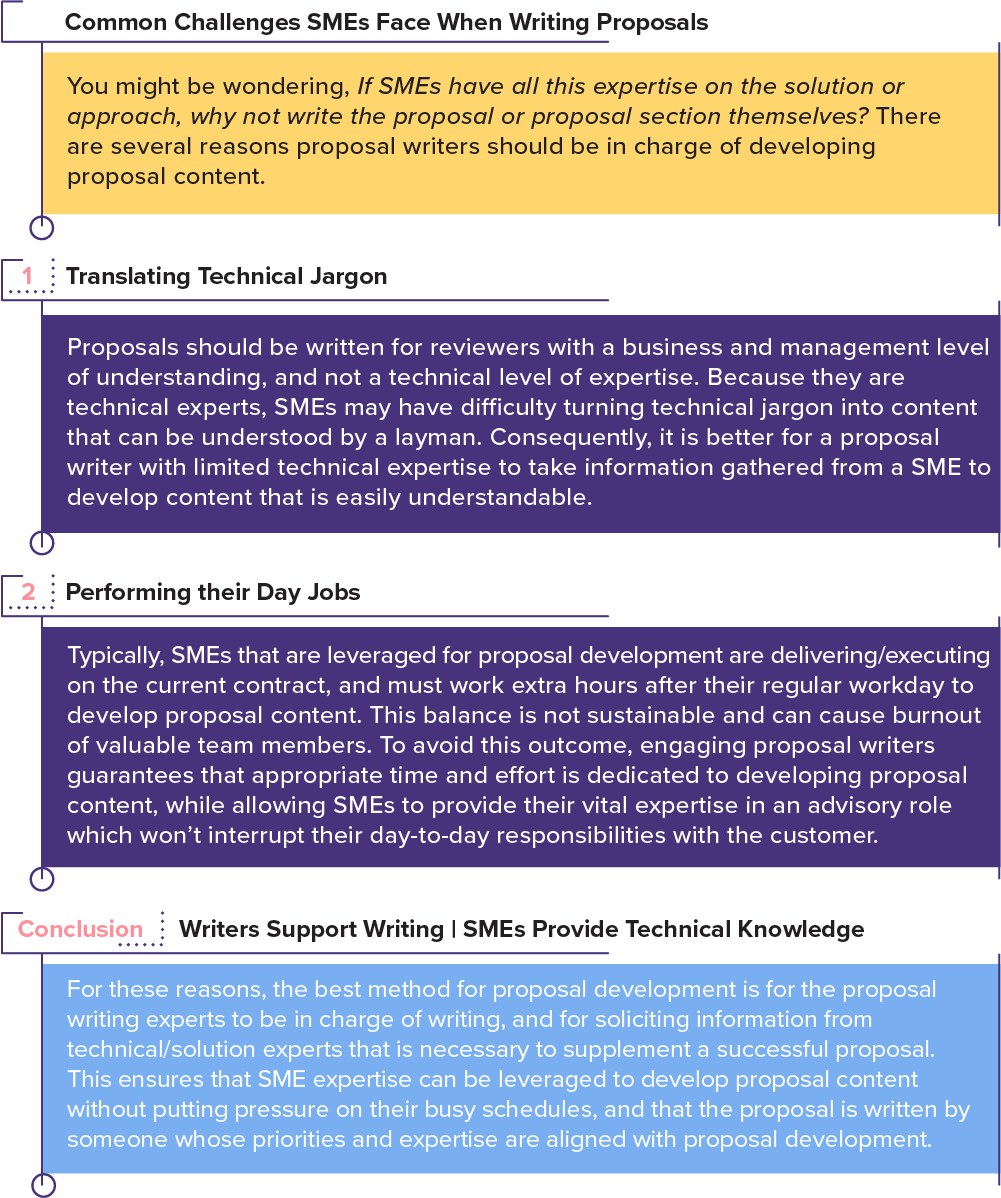
Why do Proposal Writers Need SMEs?
As a proposal writer, you will need to consult a SME if you need specialized or technical information about the proposed solution to address specific solicitation requirements. This information will increase your ability to effectively demonstrate the strengths of the proposing team’s solution and its benefits to the customer.
Areas of expertise a SME may have insight into that can improve a proposal include:
- The solution, product, or service being proposed.
- Industry-specific knowledge about the work requested in the solicitation (including best practices, methodologies, and tools).
- The organization requesting the work (including their executive leadership, mission and goals, and management or technical environment).
- The proposing company’s experience and past performance references.
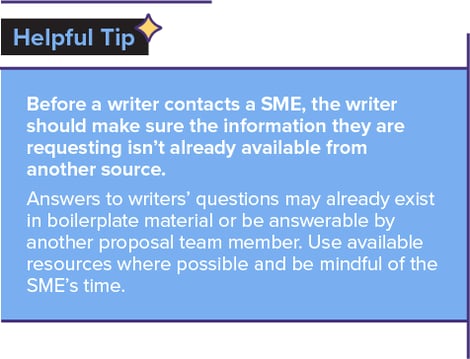
The proposal manager is responsible for deciding if and where (which sections) SME contributions are necessary in the proposal. The proposal manager identifies which SMEs are to be contacted for each section within the Proposal Management Plan or the proposal outline.
If a Proposal Management Plan or outline is not available, the writer should communicate with the proposal manager directly for assistance in identifying the appropriate SME(s) for their assigned sections. However, proposal writers should also read through the solicitation—the Request for Proposal (RFP) or Request for Quotation (RFQ)—prior to starting writing to identify sections that need SME support. Content gaps that require SME input become more apparent as a proposal writer begins gathering material for sections.
Note that one area that will almost always need a SME is the technical approach/solution; writers that work on this section should expect to work closely with a SME to develop it. The following table shows proposal sections that often require input from SMEs.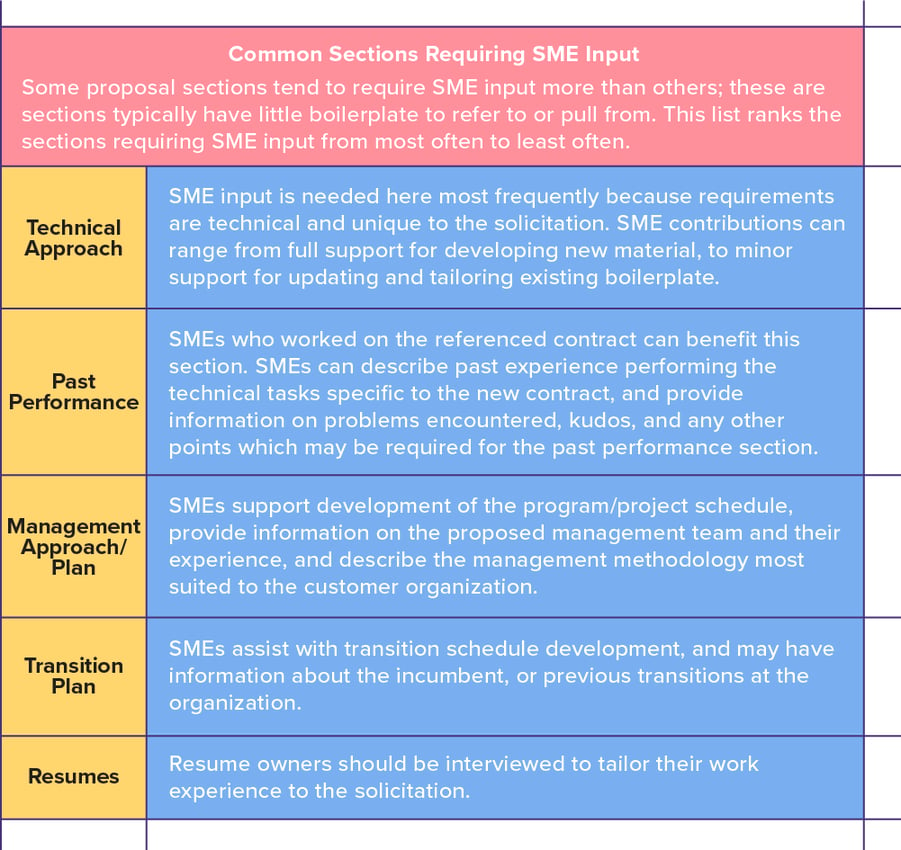
How do SMEs fit into the proposal lifecycle?
Remember: SMEs are busy; proposals compete with their daily, customer priorities.
As writers, we must remain cognizant of SMEs’ time. Create a meeting schedule that allows them time to prepare and/or gather your requested information, as well as time for yourself to compile the information and incorporate it into your section by the upcoming proposal schedule deadline. To create a schedule, the need for SMEs must be identified early in the proposal development process, ideally, during storyboarding and content development sessions.
This will ensure you have enough time to send data calls to SMEs and receive responses, perform interviews, schedule follow-up meetings, and/or submit more data calls to get any additional information needed. The following graphic demonstrates when SME-related activities should take place in the proposal lifecycle prior to each Color Team Review.
What do proposal writers need to prepare before contacting SMEs?
As SMEs tend to have limited time to develop proposal material, it’s important to be well prepared before communicating and/or interviewing them.
Be sure to study the proposal requirements and understand what information you will need from the SME. You should complete the following tasks before contacting a SME:
- Study the RFP to understand the proposal requirements, and what information you need for the proposal to develop interview/data call questions.
- Listen to solution overview discussions between technical experts, SMEs, and program operations (including call recordings) prior to SME interviews/data calls.
- Do some online research to get a basic understanding of your sections’ topics (including technical jargon). This will enable you to develop targeted questions for the SME and understand the solution they will be discussing with you.
- Review the developed win themes and discriminators for the overall proposal and identify which are appropriate to include in your sections. When soliciting material from the SME, make sure to get information that will reinforce these win themes.
- Make sure your section’s outline is as complete as possible so that you can easily insert information later. You can also share your outline with your SME to help them understand the focus of your discussion.
- Use your knowledge of the solicitation and the proposal outline to develop targeted questions to ask the SME. These questions will serve as the basis for a formal data call or interview questions; they should guide the SME into adequately addressing the solicitation requirements, and the unique facets of the proposing company’s capabilities and solution. While the questions you ask will change depending on the proposal, and proposal section, you should always include the following in your list (these questions are all included further on in this article in our SME Data Call Template):
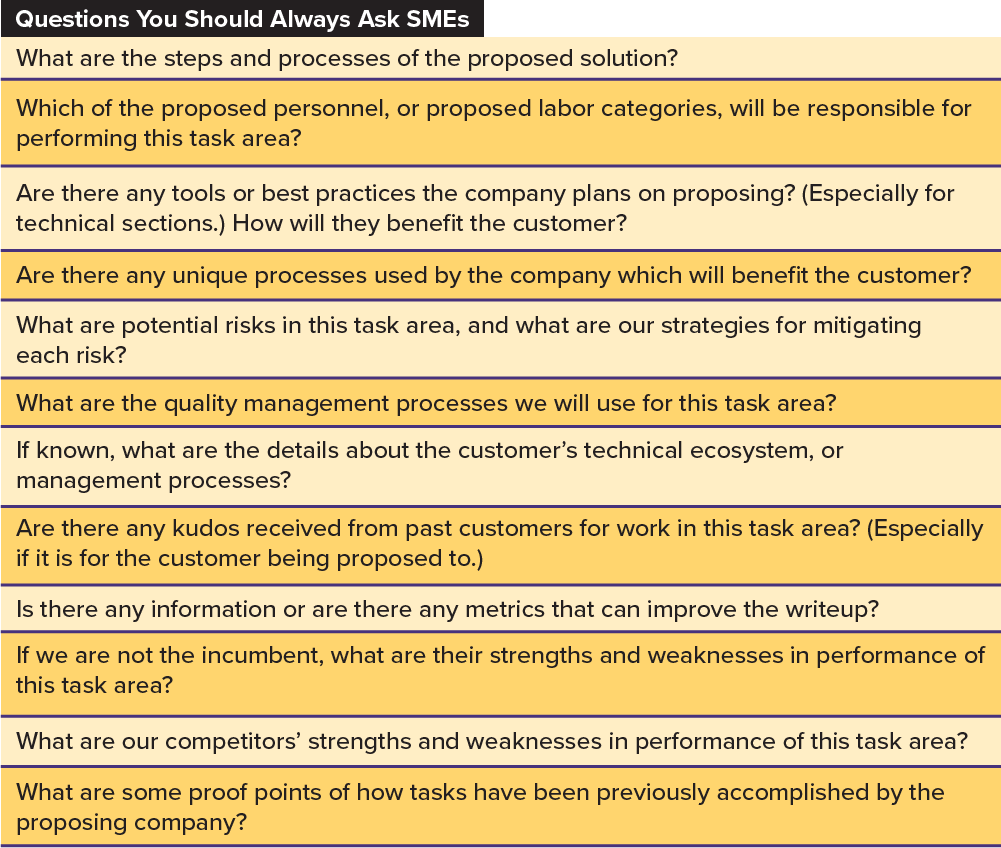
These questions are useful for any proposal section and help guide the SME into providing information that strengthens the section with important details about the solution, proof points, and benefits to the customer.
How can writers solicit information from SMEs?
As stated earlier, it’s important to understand the type and amount of support needed from a SME before requesting their help. If you only have a few simple questions, sending an email is an appropriate method of contact. For anything more involved, writers should consider one of the following methods: submitting a data call, scheduling a call/interview, or using a combination of the two methods. In the following sections, we explore which methods are most appropriate in which situations. 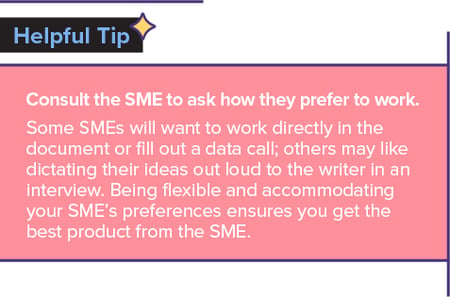
Data Calls
What is a data call? According to the KSI Advantage™ Capture & Proposal Guide, data calls are questionnaires used to gather data and ensure consistency and adequacy of proposal information both internally and from team members.
When should data calls be used? Use data calls if specific questions need to be answered, or detailed requirements need to be addressed. This is a great method if the SME is a good writer, or prefers working independently on material. This method also works well if SMEs have access to boilerplate which they can use to fill in data call sections.
Data calls help keep SMEs on-topic and focused on the solicitation requirements; sometimes SMEs focus too much on what the company does well (even if it isn’t relevant to the section), rather than specifically addressing the requirements of the RFP—the data call method mitigates this issue.
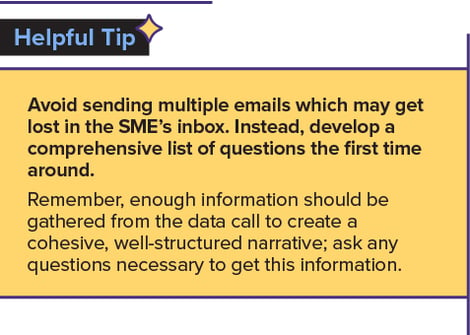 How do I make a data call? Structure data calls using the following methods:
How do I make a data call? Structure data calls using the following methods:
- Use headings that correspond with the existing outline of the proposal section, with instructions for addressing each heading. Use this method if the outline corresponds closely with the solicitation requirements (i.e., the SOW heading is “SOW 1.2.3. The Contractor must provide a quality management system,” and the corresponding outline heading is, “Our Team’s Quality Management System (SOW 1.2.3.)”). However, be sure to add in any requirements or instructions that are not directly mentioned in the outline.
- Use headings based on the RFP requirements of the proposal section, with instructions for addressing each heading (i.e., using just the SOW heading from the previous example: “SOW 1.2.3 The Contractor must provide a quality management system”). Use this method if the proposal outline is not detailed enough to support a data call.
- Create a list of questions addressing the solicitation requirements. Include instructions to give the SME an idea of what to include, and any additional solicitation instructions/requirements.
For each method, ask the SME for a sentence or two, or a short paragraph, to address each requirement, depending on how much information you need and the page limitations for the section.
Other data call best practices:
- If information is needed for multiple sections, break it up into multiple data calls; this keeps the information organized, and separated into less intimidating chunks for the SME to address.
- Develop the data call in a Word document (leave detailed instructions for responding to headings/questions) and email it to the SME.
- Remember: Provide the SME with a clear deadline to return the data call. Allow the SME sufficient time to complete the data call (at least a few days to a week) depending on the level of information requested. Also, be sure to give yourself time to integrate information into the proposal, ideally before the next proposal deadline, such as color team reviews. If sending multiple data calls, consider staggering deadlines to give the SME time to gather information.
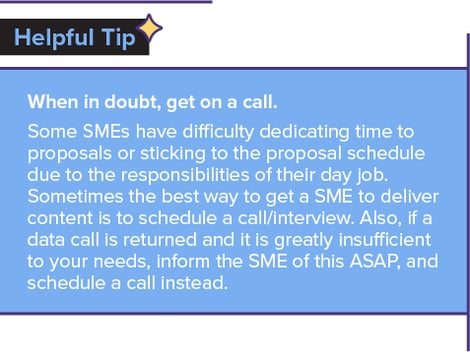
When should data calls NOT be used? If requirements are broadly stated or vague, and you have little idea as a writer of how to structure the section, then it is more appropriate to interview the SME. Interview-style meetings are greatly beneficial for SMEs that prefer to talk through their knowledge rather than writing it down, or are less responsive to emails.
SME Interviews
What is a SME interview? A SME interview is a session where a proposal writer asks a SME a set of prepared questions (in person, over the phone, or via computer conference) and takes notes on the responses.
When should SME interviews be used? You should schedule a call/interview with a SME in the following cases:
- If requirements are broadly stated or vague—and you have little idea as a writer of how to structure the section—leverage the SME’s expertise in the subject matter to structure the narrative.
- If the SME prefers to dictate information to a writer or is reluctant to respond to a data call or email.
- If you are better at understanding complex subject matter if it is explained verbally, and if you have the opportunity to ask additional questions.
- If a returned data call does not meet the your needs, use a follow-up interview to fill in gaps.
How should interviews be structured? There are a few ways to structure interview questions and notetaking during interviews:
- Make a data call. Writers can move through questions and topics one at a time from a data call, and take notes on the SME’s responses. Sending data calls to a SME before interviews can be helpful too, so the SME can review questions and prepare their answers ahead of time.
- Take notes and ask questions using the proposal outline. This should be done only if the proposal outline has detailed subheadings, and it is clear where the information being discussed belongs under these headings.
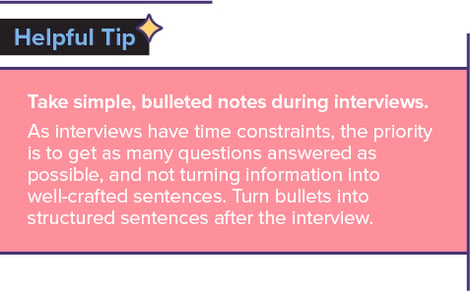 Other interview best practices:
Other interview best practices:
- If possible, record the interview so you can take additional notes later, or go back to get clarity on a point. This is especially helpful if the SME talks fast or is otherwise hard to understand, or if the information is incredibly detailed.
- Conduct the interview through a web video platform that allows you to share screens. Share your screen so that the SME can see what you’re writing and make any necessary edits in real-time.
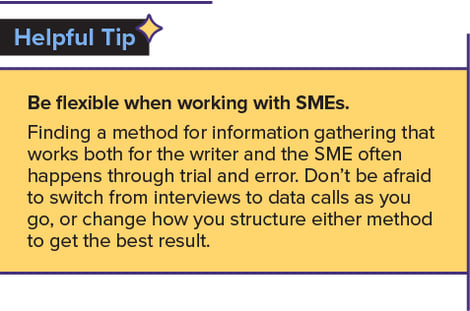
When should interviews NOT be used? Avoid interviews if the SME communicates more effectively in writing, has difficulty staying on topic, if you have difficulty scheduling a meeting/call with the SME, or if the SME tells you they prefer to write and work independently. Also, if you try an interview and it is unsuccessful, you can always develop a data call instead.
How do proposal writers develop content and address gaps from SME input?
Now it’s time to review all your notes and data calls to develop content; you should have all the technical details, proof points, features/benefits, etc., necessary to build a comprehensive write-up that addresses the solicitation requirements and effectively represents the company’s proposed solution.
SMEs should be included in color team reviews so they can review your content; however, you can also hold informal reviews between color team reviews (or, rolling reviews) to minimize downtime throughout the proposal development process. This is the quickest and easiest way to address any remaining questions, identify errors, and further develop any parts of the narrative which need improvement or clarification. Web meetings and screen sharing are particularly suited for this purpose; writers can make live edits in their section according to the SME’s commentary.
Conclusion/Key Takeaways
Here are a few important things to remember as a proposal writer dealing with SMEs:
- SMEs can provide technical, industry, and customer expertise information to strengthen proposal response.
- It is the proposal writer’s responsibility to get relevant information from SMEs and use the information, as well as the SMEs’ time, effectively.
- The best ways to solicit information from SMEs include using data calls, interviews, and a mix of both these methods.
- To effectively schedule interviews and data call submissions, consider both the proposal schedule and lifecycle, as well as the SME’s availability.
- Cultivate a positive professional relationship with SMEs to facilitate a productive work environment; be polite, and considerate of the SMEs’ time and availability, and thank them for their time and effort often!



